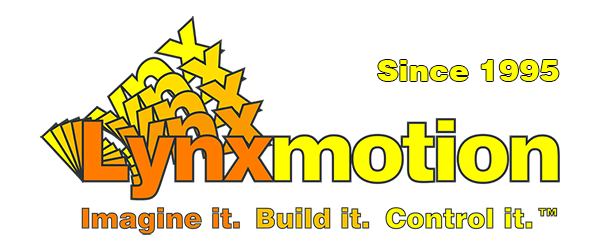Changes for page LSS Communication Protocol
Last modified by Eric Nantel on 2025/06/06 07:47
Summary
-
Page properties (1 modified, 0 added, 0 removed)
Details
- Page properties
-
- Content
-
... ... @@ -283,8 +283,15 @@ 283 283 284 284 Ex: #5QSD<cr> might return *5QSD1800<cr> 285 285 286 -Note that the QSD query will return the current servo speed. Querying the last maximum speed value set using SD or CSD is not possible. 286 +By default QSD will return the current session value, which is set to the value of CSD as reset/power cycle and changed whenever a SD/SR command is processed. 287 +If #5QSD1<cr> is sent, the configured maximum speed (CSD value) will be returned instead. You can also query the current speed using "2" and the current target travel speed using "3". See the table below for an example: 287 287 289 +|**Command sent**|**Returned value (1/10 °)** 290 +|ex: #5QSD<cr>|Current session value for maximum speed (set by latest SD/SR command) 291 +|ex: #5QSD1<cr>|Current maximum speed configured (set by CSD/CSR) 292 +|ex: #5QSD2<cr>|Current speed. 293 +|ex: #5QSD3<cr>|Target travel speed. 294 + 288 288 Configure Speed in Degrees (**CSD**) 289 289 290 290 Ex: #5CSD1800<cr> ... ... @@ -301,13 +301,20 @@ 301 301 302 302 Ex: #5QSR<cr> might return *5QSR45<cr> 303 303 304 -Note that the QSD query will return the current servo speed. Querying the last maximum speed value set using SR or CSR is not possible. 311 +By default QSR will return the current session value, which is set to the value of CSR as reset/power cycle and changed whenever a SD/SR command is processed. 312 +If #5QSR1<cr> is sent, the configured maximum speed (CSR value) will be returned instead. You can also query the current speed using "2" and the current target travel speed using "3". See the table below for an example: 305 305 306 -Configure Speed in Degrees (**CSR**) 314 +|**Command sent**|**Returned value (1/10 °)** 315 +|ex: #5QSR<cr>|Current session value for maximum speed (set by latest SD/SR command) 316 +|ex: #5QSR1<cr>|Current maximum speed configured (set by CSD/CSR) 317 +|ex: #5QSR2<cr>|Current speed. 318 +|ex: #5QSR3<cr>|Target travel speed. 307 307 320 +Configure Speed in RPM (**CSR**) 321 + 308 308 Ex: #5CSR45<cr> 309 309 310 -Using the CS Dcommand sets the servo's maximum speed which is saved in EEPROM. In the example above, the servo's maximum speed will be set to 45rpm. When the servo is powered on (or after a reset), the CSDvalue is used. Note that CSD and CSR are effectively the same, but allow the user to specify the speed in either unit. The last command (either CSR or CSD) is what the servo uses for that session.324 +Using the CSR command sets the servo's maximum speed which is saved in EEPROM. In the example above, the servo's maximum speed will be set to 45rpm. When the servo is powered on (or after a reset), the CSR value is used. Note that CSD and CSR are effectively the same, but allow the user to specify the speed in either unit. The last command (either CSR or CSD) is what the servo uses for that session. 311 311 312 312 __14. Rigidity (R)__ 313 313 ... ... @@ -378,7 +378,7 @@ 378 378 __18. Baud Rate__ 379 379 380 380 A servo's baud rate cannot be set "on the fly" and must be configured via the CB command described below. The factory default baud rate for all servos is 9600. Since smart servos are intended to be daisy chained, in order to respond to the same serial bus, all servos in that project should ideally be set to the same baud rate. Setting different baud rates will have the servos respond differently and may create issues. Available baud rates are: 9.6 kbps, 19.2 kbps, 38.4 kbps, 57.6 kbps, 115.2 kbps, 230.4 kbps, 250.0 kbps, 460.8 kbps, 500.0 kbps, 750.0 kbps*, 921.6 kbps*. Servos are shipped with a baud rate set to 9600. The baud rates are currently restricted to those above. 381 -*: Current tests reveal baud rates above 500 kbps are unstable and can cause timeouts. Please keep this in mind if using those / testing them out. 395 +\*: Current tests reveal baud rates above 500 kbps are unstable and can cause timeouts. Please keep this in mind if using those / testing them out. 382 382 383 383 Query Baud Rate (**QB**) 384 384

